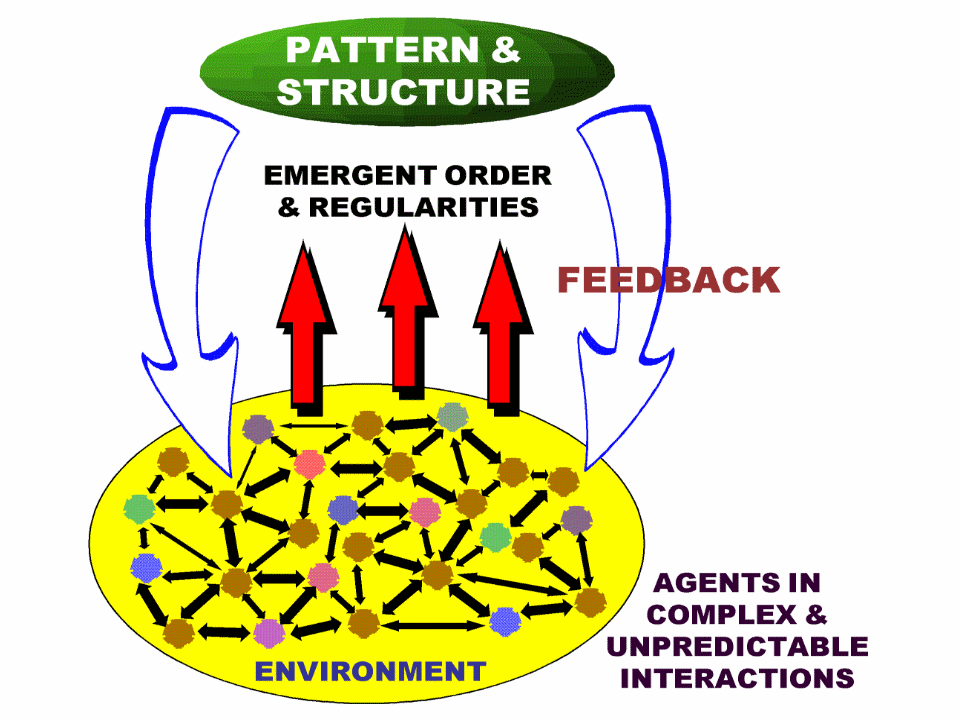to help themselves,
to release and realise more of their potential
Dennis Martin Consultants
Contact us and see how we can work together and create a path to the future that you, your people and your business deserve.
- home index page
- complex adaptive systems
Complex Adaptive Systems:
a Major Secret of Success
in both Mentoring and Leadership
Just before the soccer match is about to kick-off, I say to you, 'what do you predict the 27th pass will be?'.
Could you do it?
WHY NOT?
Page Key Points
On this Complex Adaptive Systems page we will explain:
* what complex adaptive systems are and how they differ from linear systems
* why the difference matters and how best to use it
* how effective mentoring and leadership may benefit from them
* why we train mentors and mentees to understand not to 'manage' them as if they are linear systems and vice versa
Complex adaptive systems need a different approach as explained below.
Have you ever wondered why there is no formula or one-size-fits-all, off the shelf solution that will guarantee a predictable result with all mentees in all situations at all times?
WHY IS THIS?
Because mentoring is a complex adaptive system, as shown by the model below, and
Managing it from the top down and trying to control it from a central point with a linear, reductionist approach will sub-optimise what can be achieved (e.g. returns on investment and mentee(s) increased potential).
The image below is a representation of a complex adaptive system

The
essential difference between a complex adaptive system and a linear
system is that a linear system is knowable and predictable in
advance.
A complex adaptive system is not.
What emerges from a complex adaptive system is unknowable and unpredictable until it happens.
Yes, let me explain why this concept is important for business mentoring and mentorship and for every one involved and for the success of your business.
By way of illustration:
Let's take a step back for a moment.
If I said to you, 'would you just switch on the lights please?'
And you do it, no problem.
That is a linear system and we could draw a flow chart showing each step involved including, if the light didn't come on, where it may be broken.
The steps in a linear system, and its outcomes, are knowable and predictable in advance.
Turning on the tap to get a drink of water is a similar predictable linear system.
Now,
imagine you and I were attending a football match (soccer).
Just before they are about to kick off, I say to you, 'what do you predict the 27th pass will be?'
Could you do it?
Probably NOT.
WHY?, because there are too many variables.
Soccer (football) is a complex adaptive system.
It is too complex to know or predict which interactions may occur and what may emerge from them.
As the image above shows in a complex adaptive system the agents (e.g. people) interact with their environment as well as with each other.
You could guess what the 27th pass might be and you could be right, it's a funny old world at times.
From birth we have learned about them, become familiar, lived with
them and experienced their unknowable unpredictability.
The weather is a complex adaptive system.
So is the economy and families and health and wealth and education and many jobs and marriage and sport and living and loving and parenting....and mentoring....and....and.....you and me.
Get the idea?
By the way, how many games of soccer would you attend if you could accurately predict every pass in every match do you think?
It's the uncertainty that makes sport exciting, isn't it?
WHY DOES IT MATTER?
If one variable in a linear system is changed, the outcome of the system will change predictably and proportionally.
Once we know this, it is knowable and predictable what will happen if the same change re-occurs and / or if we prevent that change from re-occurring we can 'control' the outcome.
In contrast, a complex adaptive system like mentoring, weather systems, or an ecosystem, is less predictable in advance due to the constant interactions and adaptations of its agents, e.g. people.
A change in even one variable, may cause the whole system to react in unexpected ways and cause unknowable in advance outcomes to emerge.
The popular chaos theory quote: A butterfly flapping its wings in Brazil can theoretically set off a tornado in Texas – would be an illustration of a complex adaptive system in action.
When it comes to mentoring and leadership, understanding the organization or team as a complex adaptive system, rather than a linear system, has considerable implications.
For example, traditional
mentoring, and leadership, will often assume a linear, top-down driven approach.
That is, the mentor, or a leader, is 'in charge', has the knowledge / experience / skills etc. and, therefore, provides guidance, instruction, and feedback to facilitate predictable improvements in the mentee's skills, or the team's performance, to achieve pre-determined goals which may be way short of the mentees' or teams' potential (i.e. unrealised possibilities).
However,
when we examine mentoring and leadership as a complex adaptive system, things are a lot different.
For example, the mentor interacts dynamically with the mentee, where both can learn, adapt, and change in response to each other's feedback. Their relationship is a two-way street.
They work together as a self-managing team with the common purpose of helping the mentee(s) to help himself or herself achieve more of his or her potential.
A major benefit of this is synergy (i.e. 2 + 2 = 5), the output is greater than the sum of the parts.
And the release and realisation of more of the potential of both mentee(s) and mentors.
In a complex adaptive system, the mentor shifts from controlling to facilitating, from dictating to listening and questioning, helping the mentee(s) to help themselves release and realise more of their potential.
This often significantly improves return on investment because it enables leaders and the business to release and realise more of their potential too.
Our learning experiences when training mentors, mentees and leaders, help them develop an understanding that the best laid plans, systems, procedures, programmes etc. may work great with linear systems but may often go 'wrong' with complex adaptive systems.
And that's because the complex interactions of the variables involved makes it unpredictable and unknowable WHAT MAY EMERGE BEFORE IT HAPPENS.
And what may emerge may be disappointing and negative or may be delightful, exciting, with unexpectedly 'brilliant' outcomes as potential is released and realised creatively.
So, we have evolved and learned a far more effective approach to help the mentee help himself or herself deal appropriately with complex adaptive systems.
And that is to enable the mentee and mentor (and their Leader(s)) to take full ownership of the mentoring process and to self-manage it as the complex adaptive system that it is.
Our bespoke and different training will help them learn not to self-manage a complex adaptive system as if it were a linear system and vice versa.
Learning from effective business mentoring that your business is a complex adaptive system will enable you and your people to see it in a different light, respect the complexities involved and feel motivated to help improve all aspects of it as a means of surviving and thriving rather than just surviving.
Understanding complex adaptive systems is a vital key for mentors to optimise the seemingly random patterns and outcomes that emerge from them, especially in terms of achieving ultimate returns on investment, growth and the release and realisation of potential.
Please click all or any of the links below if you would like more information:
* bespoke and different (how our approach differs)
* The Lubrizol Story (how we won a UK National Training Award for a 'revolutionary and inspiring' process based on complex adaptive systems in a manufacturing business)
If reading this page has left you with questions, suggestions, disagreements etc., and you wish to share them with me, please complete the Contact Help Form for Dennis below and I'll get back to you.
Zero cost and obligation for you, of course.
Page Summary
On this page we have explained:
* what complex adaptive systems are and how they differ from linear systems
* why the difference matters and how best to use it
* how effective mentoring and leadership may benefit from them
* why we train mentors and mentees to understand not to 'manage' them as if they are linear systems and vice versa
We've covered a lot of ground on this page and I just want to THANK YOU for visiting my web site and reading this page. Your attention is much appreciated.
I hope you found the page as worthwhile and interesting reading it as I did writing it.
Kindest regards,
Dennis
